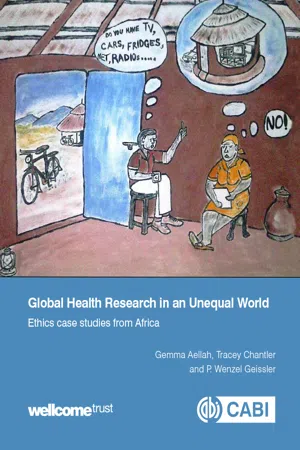
eBook - ePub
Global Health Research in an Unequal World
Ethics Case Studies from Africa
- English
- ePUB (mobile friendly)
- Available on iOS & Android
eBook - ePub
Global Health Research in an Unequal World
Ethics Case Studies from Africa
About this book
This book is a collection of fictionalised case studies of everyday ethical dilemmas and challenges, encountered in the process of conducting global health research in places where the effects of global, political and economic inequality are particularly evident.
Frequently asked questions
Yes, you can cancel anytime from the Subscription tab in your account settings on the Perlego website. Your subscription will stay active until the end of your current billing period. Learn how to cancel your subscription.
No, books cannot be downloaded as external files, such as PDFs, for use outside of Perlego. However, you can download books within the Perlego app for offline reading on mobile or tablet. Learn more here.
Perlego offers two plans: Essential and Complete
- Essential is ideal for learners and professionals who enjoy exploring a wide range of subjects. Access the Essential Library with 800,000+ trusted titles and best-sellers across business, personal growth, and the humanities. Includes unlimited reading time and Standard Read Aloud voice.
- Complete: Perfect for advanced learners and researchers needing full, unrestricted access. Unlock 1.4M+ books across hundreds of subjects, including academic and specialized titles. The Complete Plan also includes advanced features like Premium Read Aloud and Research Assistant.
We are an online textbook subscription service, where you can get access to an entire online library for less than the price of a single book per month. With over 1 million books across 1000+ topics, we’ve got you covered! Learn more here.
Look out for the read-aloud symbol on your next book to see if you can listen to it. The read-aloud tool reads text aloud for you, highlighting the text as it is being read. You can pause it, speed it up and slow it down. Learn more here.
Yes! You can use the Perlego app on both iOS or Android devices to read anytime, anywhere — even offline. Perfect for commutes or when you’re on the go.
Please note we cannot support devices running on iOS 13 and Android 7 or earlier. Learn more about using the app.
Please note we cannot support devices running on iOS 13 and Android 7 or earlier. Learn more about using the app.
Yes, you can access Global Health Research in an Unequal World by Gemma Aellah,Tracey Chantler,P. Wenzel Geissler,Johnson Ondiek in PDF and/or ePUB format, as well as other popular books in Medicine & Ethics in Medicine. We have over one million books available in our catalogue for you to explore.
Information
PART ONE:
TRAINING CASE STUDIES
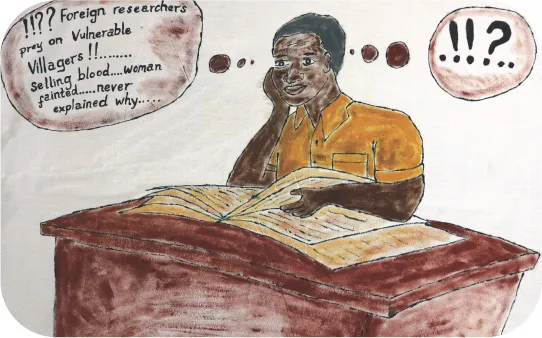
‘THINKING ABOUT THESE THINGS WAS NOT GOING TO BE EASY’, THOUGHT ALOUIS.
RESEARCHER-PARTICIPANT RELATIONSHIPS
TRAINING CASE STUDIES
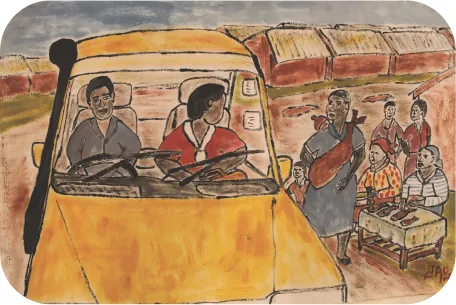
EVERYONE WAS WONDERING: WHO WAS CARO’S SMARTLY DRESSED ‘FRIEND’ WITH THE BIG CAR…?
RESEARCHER-PARTICIPANT RELATIONSHIPS
CASE STUDIES
How can we best categorize the relationship between researcher and participant? One is paid; the other is not, yet is not a customer or receiving a service. One seems more powerful, yet cannot function without the other; he or she cannot proceed in the relationship without the other’s explicit consent. They are not friends, yet often share intimate details – albeit one-sided – about their lives. Their relationship is at once highly technical and sometimes deeply human. Furthermore, it is one which, while at first glance – in the moment of drawing blood or obtaining consent – seems to be a relationship between two individuals, in reality stands for relationships between whole populations, countries, governments and institutions.
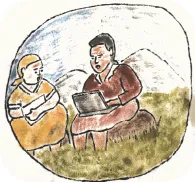
COLLECTING INFORMATION, CONNECTING WITH PEOPLE
The stories in this section concern this unique relationship. They explore standard ethical concerns such as the informed consent process, coercion, and transparency. They also explore less commonly talked about issues such as friendship and kin-like relationships between researchers and participants, as well as the emotional struggle researchers sometimes deal with when faced with the conditions of abject poverty experienced by some participants. The stories look at relational ethical dilemmas, such as when research clinicians faced with sick participants are forced to decide whether to be foremost researchers, or clinicians.
FURTHER READING
Special Issue: Fieldworkers at the interface between research institutions and local communities. Developing World Bioethics 13(1)
FIELDWORK AND FRIENDSHIP:
WORKING IN YOUR OWN COMMUNITY
LEARNING OBJECTIVE
To consider the challenges of working for research programmes in one’s own community, especially when competing for limited employment opportunities, and to identify possible solutions
KEYWORDS
Informed consent
Community-based fieldworkers
Friendship
Employment issues
FACILITATOR’S NOTES
This story focuses on the blurred lines between fieldwork and friendship when researchers are employed in their own communities.
Many research organizations rely heavily on the unique expertise of local community interviewers (also called ‘villager reporters’, ‘community health workers’, etc.), who are valued for their local understanding and their ability to negotiate both individual and collective consent. However, the personal position of such a worker is delicate, as they may feel pressure to represent the interests of both the research organization and the trial participants. Many conflicts and misunderstandings between organizations and their target communities are related to competition for limited employment in an already challenging economic environment. Paid interviewers often have to deal with resentment of their own economic good fortune, at the same time as working to encourage community members to participate in projects for free. Local staff may also be working directly with research participants who are friends or relatives, which adds extra pressure. How do they handle this?
This case study is designed both to encourage staff members in similar situations to express their personal challenges, and to help senior staff better understand these challenges. As such, care needs to be taken when setting the ground rules for this discussion. The facilitator needs to think carefully about the possible consequences of encouraging staff to open up about this topic. Many research organizations have strict rules governing conduct between researchers and participants. Will there be any consequences for staff if you encourage them to speak freely? The range of the discussion should be made clear at the beginning and this may involve extra preparation to create a ‘safe space’. For example, if possible it would be helpful to be able to assure participants that there will be no disciplinary action if they discuss personal experiences that may have violated regulatory ethics. If this is not possible, we recommend you steer the discussion carefully away from areas where disclosure could lead to staff being disciplined later. The final discussion should include a discussion and comparison of different types of ethics – regulatory, and relational or individual.
HANDOUT
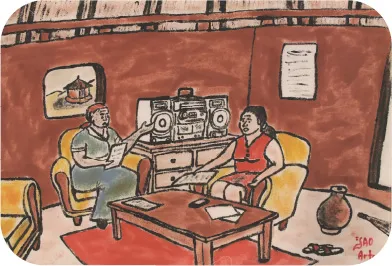
THE TENSION WAS PALPABLE AS JENNY READ MAGGIE THE CONSENT FORM
THE STORY
Jenny is a community interviewer for a transnational research organization, and is employed on a casual contract to work in her own marital village, where she has a long history of community work. As well as casual work for the research organization, she provides voluntary home-based care for people living with HIV/AIDS. She is also the secretary of a local network of women’s self-help groups, and a church teacher. She has helped the research station on a number of projects over the past ten years, and has gone on numerous training courses.
At the moment, Jenny is working on a project looking at the feasibility of distributing condoms to women door-to-door. Her role is to visit women in their homes, explain the study to them and obtain their informed consent. Today she visits Maggie, a younger woman living with her husband and child. Maggie is a teacher working in a nearby school so Jenny visits her on the weekend when she knows she will be in. Jenny and Maggie have known each other for a long time. Before Maggie trained to be a teacher, Jenny organized for her to assist her as a village reporter on a research project. But, after that project finished, Maggie was not asked to assist again. Jenny says that this was because Maggie ‘didn’t know the right way to talk to people’.
When Jenny arrives at Maggie’s home she is greeted cordially and invited to sit. After exchanging greetings and some local news, Jenny starts to explain the new study to Maggie. Soon, however, the atmosphere becomes a little awkward. Jenny stumbles over her words when reading the form and Maggie corrects her disdainfully. Maggie’s husband arrives when they are still going through the consent form, and stays to listen. When they get to the end, Jenny asks Maggie if she is happy to be visited and given the condoms every month. Maggie says loudly, ‘No, I do not consent. It is my right. Look here, it says I can say no. You need to say that it is my right to say no. Say that first.’
Jenny is a bit taken aback at Maggie’s tone, but agrees that of course Maggie can say no. She looks for her pen. ‘Look,’ says Maggie, ‘this lady is not prepared, where is her pen?’ Maggie’s husband is clearly uncomfortable. He asks Jenny to tell him what the research is about. But before Jenny can answer, Maggie tells him, ‘Why are you asking her? I know what it is about.’ Maggie and her husband start to bicker, and now Jenny is uncomfortable. She tells Maggie she will come back later for the consent form and leaves quickly.
Walking away, Jenny is clearly upset. A researcher accompanying her on the visit asks her what went wrong. ‘I don’t know,’ replies Jenny, ‘we used to be such good friends, and now look at the way she talks to me. She has become so arrogant since she became a teacher. I won’t be able to do good work in that home again. Last month, she promised me she would take her child to the clinic for that vaccine study. She kept saying she was going to and then she didn’t. In the end I arranged for a motorbike to take them. Then she left me to pay for it!’
‘Do you think it was because I was there?’ the researcher asks. ‘Perhaps,’ Jenny replies. ‘I don’t know. I think she is also having some problems with her husband. He has been staying away a lot. I did hear he might be getting a second wife.’
QUESTIONS




GROUP ACTIVITY
Divide into two groups. Drawing on their own experience, the first group brainstorms the ethical dilemmas and possible tensions somebody like Jenny may face. Again drawing on their own experience, the second group explores the bene...
Table of contents
- Cover Page
- Title Page
- Copyright Page
- Forewords
- Preface
- Acknowledgements
- Contents
- Finding your way around the book
- INTRODUCTION
- PART ONE: TRAINING CASE STUDIES
- PART TWO: ACADEMIC BACKGROUND
- REFERENCES
- INDEX OF CASE STUDIES
- ABOUT THE CONTRIBUTORS
- Footnote